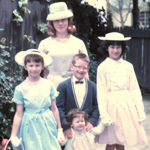Guys,
Firstly let me say, I think the person concerned is VERY wrong --- or is it me!!!!!!!!!
Last week I was attending an audio/lighting/staging exhibition/conference and as part of this (I had a bit of spare time), I decided to attend one of the seminars that were being run.
The seminar was on tips for the home/project studio owner (a console and hardware recorder were not mentioned once, everything was either Protools or Logic). The seminar's presenters (I believe) were a couple of lecturers from a private audio school or similar --- whatever, they presented themselves as God's gift to the music industry.
At the conclusion of the presentation, attendees were invited to ask questions. One question asked was "how would you suggest recording a choir (say in a school hall) without every member of the choir wearing headphones to hear the previously recorded music backing track". Quite an interesting question and one that made me think.
The answer given (and what I disagree with) was as follows:
"Set two mics in MS/XY or whatever fashion best suites the location and choir, then place a foldback speaker on the floor directly below or evenly spaced between the microphone stands (in the case of spaced left/right mic placement), now raise the level of the foldback just enough to be compfortably heard by the choir and do the recording. On playback you will hear the foldback quite clearly in the mix. Now, without adjusting any levels of foldback or microphone or without moving anything, undertake a second recording of the choir.
After the second recording, when playing back the two recorded tracks, place one of the tracks out of phase and raise the level of both faders to the same position. You will now find that the sound from the foldback speaker is cancelled out, now you can raise the level of the previously recorded backing track and all will be perfect.
You can continue to record this way for other parts of the choir (ie undertake harmony parts, etc), provided you always record the part twice and then place one recording out of phase."
Now, if I am correct, the lecturer has no idea what he is talking about and what are the students (who would be paying big money for the course) being taught and what would be their ability when released into the world of sound recording???????????????
If the choir sings the same part twice (I realise that there will always be slight differences in vocal phrasing, timing, etc), wont all of the choir -- or at least a good part of it, also be out of phase and cancel out, or at least have a lot of phasing problems with the end result sounding s*#t, and with the more takes recorded adding to the problem when all the recorded tracks are mixed. I would also presume that the problem would be even worse if the final product was mixed or played back in Mono?
David
OT: Recording a Choir!!!!!
20 posts
• Page 1 of 2 • 1, 2
-

csp - Premium Member

- Posts: 679
- Joined: Mon Dec 15, 2008 4:00 am
- Location: Gold Coast region, Queensland, Australia
Re: OT: Recording a Choir!!!!!
I'm with you david, I think it's correct all the way till the second take where you make another pass without the choir singing but still standing in the same positions as to keep the physics of it all happy.
-Casey
-Casey
d8b V3 into RME HDSP 9652 with Cubase 7.5
-
Casey_Pittman - Premium Member

- Posts: 342
- Joined: Mon Aug 31, 2009 10:51 pm
- Location: Texas
Re: OT: Recording a Choir!!!!!
Casey,
I agree that if the choir does not sing on each of the second takes, it should work, BUT he was suggesting that the choir sing "exactly" the same thing, during the recording of each of the even (ie second) takes and then mixing the two pairs with the second take of each version out of phase.
David
I agree that if the choir does not sing on each of the second takes, it should work, BUT he was suggesting that the choir sing "exactly" the same thing, during the recording of each of the even (ie second) takes and then mixing the two pairs with the second take of each version out of phase.
David
-

csp - Premium Member

- Posts: 679
- Joined: Mon Dec 15, 2008 4:00 am
- Location: Gold Coast region, Queensland, Australia
Re: OT: Recording a Choir!!!!!
I just recorded two small youth choirs singing BGV on a few of Carolyn's scriptural songs. One group we recorded in a medium sized bedroom in a house the church owned (only place available), and the other was in the Sanctuary of another church. I used small monitors for playback. Pair of matched Oktava mics in ORTF (well, NOS, really) for recording. I wish I would have thought of the phase trick (as you described). Techniques like that usually don't end up working of me, but it's a darn good idea and I would have tried it if I would have thought of it. I did have a little trouble with bleed. Nothing major though, and in some ways it helped.
The instructor probably just got confused under pressure (I've done that). Besides, it's fun to let the little brains of mush get wrong information. It builds character.
c-ya,
Dan Worley
The instructor probably just got confused under pressure (I've done that). Besides, it's fun to let the little brains of mush get wrong information. It builds character.
c-ya,
Dan Worley
-

Dan Worley - Premium Member

- Posts: 113
- Joined: Fri Nov 21, 2008 8:33 pm
Re: OT: Recording a Choir!!!!!
David, maybe feeding the false info was his way of ensuring his superiority to the rest of us!  I almost went to one of those schools.......glad I opted for real world experience instead if thats whats being taught.
I almost went to one of those schools.......glad I opted for real world experience instead if thats whats being taught.
-Casey
-Casey
d8b V3 into RME HDSP 9652 with Cubase 7.5
-
Casey_Pittman - Premium Member

- Posts: 342
- Joined: Mon Aug 31, 2009 10:51 pm
- Location: Texas
Re: OT: Recording a Choir!!!!!
Casey,
I have to agree.
During my almost 50 years in the business (am I really that old!!!!!!!) I have permentaly enrolled at the best training institution in the world ---- "The University of Hard Knocks".
I have also seen the result/ability/professionalism of many students who have attended some of the VERY well known and super expensive private and state run music/recording institutions and many would not know the difference between a microphone and a recorder, BUT they still had that magic piece of paper that said they were fully qualified professionals.
No wonder some much of the music released today sounds like ?????
David
I have to agree.
During my almost 50 years in the business (am I really that old!!!!!!!) I have permentaly enrolled at the best training institution in the world ---- "The University of Hard Knocks".
I have also seen the result/ability/professionalism of many students who have attended some of the VERY well known and super expensive private and state run music/recording institutions and many would not know the difference between a microphone and a recorder, BUT they still had that magic piece of paper that said they were fully qualified professionals.
No wonder some much of the music released today sounds like ?????
David
-

csp - Premium Member

- Posts: 679
- Joined: Mon Dec 15, 2008 4:00 am
- Location: Gold Coast region, Queensland, Australia
Re: OT: Recording a Choir!!!!!
I actually think in theory this makes a lot of sense.... i think....hmmm...would love to have the time and people and all that crap to test it out ....that's not gonna happen. frankly, it's what I would have suggested if i was a little bit smarter or younger ( my brain is all f'ed up )...heheh....
- yeskeys
- Premium Member

- Posts: 63
- Joined: Wed Jan 20, 2010 8:41 pm
Re: OT: Recording a Choir!!!!!
You don't need a whole choir to do this. Just set up a stereo pair and a playback loudpeaker. Record yourself singing then print another stereo track with you just standing there being quiet taking up space  and flip the second stereo pair out of phase. You should get a pretty clean vocal track of yourself with minimal artifacts.
and flip the second stereo pair out of phase. You should get a pretty clean vocal track of yourself with minimal artifacts.
I've done similar things with aco gtrs recoded live with a butt load of low end feedback coming off the monitor they were standing in front of.
Made an exact copy of the track on a new track, flipped one out of phase thus canceling them both out then snuck in the frequencies I wanted from the original at the same time cutting the same frequencies of the copy. Must keep level and panning exactly the same or it wont work right. It held up ok in mono, but this was an extreme case and don't recommend for every day practice.
My favorite Stereo setup right now is an M/S config. Love the amount of control it offers when done right!
-Casey
I've done similar things with aco gtrs recoded live with a butt load of low end feedback coming off the monitor they were standing in front of.
Made an exact copy of the track on a new track, flipped one out of phase thus canceling them both out then snuck in the frequencies I wanted from the original at the same time cutting the same frequencies of the copy. Must keep level and panning exactly the same or it wont work right. It held up ok in mono, but this was an extreme case and don't recommend for every day practice.
My favorite Stereo setup right now is an M/S config. Love the amount of control it offers when done right!
-Casey
d8b V3 into RME HDSP 9652 with Cubase 7.5
-
Casey_Pittman - Premium Member

- Posts: 342
- Joined: Mon Aug 31, 2009 10:51 pm
- Location: Texas
Re: OT: Recording a Choir!!!!!
Casey_Pittman wrote:
My favorite Stereo setup right now is an M/S config. Love the amount of control it offers when done right!
-Casey
If you're doing M/S, one side is already flipped so how do you deal with that to cancel out the monitor? Do you flip the sides of Take-2 opposite that of Take-1?
Example:
Take1:
Left: Pos
Right: Neg
Mid: Pos
Take 2
Left: Neg
Right: Pos
Mid: Neg
c-ya,
Dan Worley
-

Dan Worley - Premium Member

- Posts: 113
- Joined: Fri Nov 21, 2008 8:33 pm
Re: OT: Recording a Choir!!!!!
Dan Worley wrote:Casey_Pittman wrote:
My favorite Stereo setup right now is an M/S config. Love the amount of control it offers when done right!
-Casey
If you're doing M/S, one side is already flipped so how do you deal with that to cancel out the monitor? Do you flip the sides of Take-2 opposite that of Take-1?
Example:
Take1:
Left: Pos
Right: Neg
Mid: Pos
Take 2
Left: Neg
Right: Pos
Mid: Neg
c-ya,
Dan Worley
Hey Dan,
You caught me rambling two things together which happens often when I don't get to talk shop for awhile
-Casey
d8b V3 into RME HDSP 9652 with Cubase 7.5
-
Casey_Pittman - Premium Member

- Posts: 342
- Joined: Mon Aug 31, 2009 10:51 pm
- Location: Texas
20 posts
• Page 1 of 2 • 1, 2
Who is online
Users browsing this forum: Google [Bot] and 39 guests